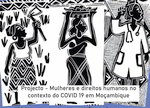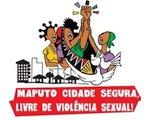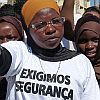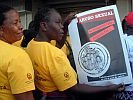Draft Law Against Domestic Violence:
Process and Rationale
Ximena Andrade
Published in Outras Vozes nº 28, supplement, November 2009
The process leading up to the formulation of the draft Law against Domestic Violence by civil society, which was handed in to the Office of Women Parliamentarians for discussion in Parliament, was based on several instances and set out from a variety of conditions that we will describe below.
First: The human rights perspective within which the Republic of Mozambique was formed, where the principle of equal human rights between individuals as citizens was the pillar upon which the constitutional rights that govern the new nation were built – among them the principle of equality between women and men.
Second: The case history on violence against women, perpetrated especially and usually within the context of marriage or of former marriage (labelled domestic violence, which we will characterise later), needed scientific information, produced by investigating reality, to evaluate its extent and characteristics. Comparative analysis of information from other countries in the region greatly helped this activity, because the region shares our concerns.
Third: Investigations on the subject started in 1989 and continue to this day. They are undertaken from several angles of knowledge of reality: in the context of the right to alimony and inheritance law, in the context of the family and justice administration. Studies on the operation of the Offices for the Support of Women and Children Victims of Violence in the police stations have followed.
The research applied in both urban and rural areas and in different regions of the country involved three dimensions of analysis: common law/positive law, customary law and practices, using the methodology of participatory research and the perspective of human rights as a theoretical model.
The information collected on violence against women showed it to be a structuring phenomenon of the manifestation of power relations that are historically unequal between women and men. These have led to male domination, discrimination against women and the creation of obstacles to their full development.
What was noticed above all, however, was that the human rights of women were violated merely for the fact of being women. If these rights are established in the Constitution and moulded in international and African instruments, specifically those on human rights, of which the Mozambican State is party, we were faced with a situation that needed to be reversed.
Among the international instruments we are referring to is the Convention on the Elimination of All Forms of Discrimination against Women (CEDAW), adopted in December 1979 by the UN. Its importance is due to the fact that it is the only legally binding instrument focusing specifically on fighting discrimination of women. The CEDAW is considered the “Women’s Human Rights Tool”, and continues to be, to this day, the main international instrument to ensure the equality of women and eradicate all types of discriminatory practices. Among these, gender violence is one of the most offensive to women’s rights, above all where it is more notorious: in the home. In other words: domestic violence.
Two specific recommendations on violence against women, focusing on home-based violence, are given to governments in this Convention. They are: (i) No. 12, published in 1989, recommends that the States parties include in their reports information on progress on (among other things) legislation in force to protect women from any violence, particularly in the family; information on other measures adopted to eradicate this type of violence; information on support services for women who are the victims of aggression and abuses, as well as statistical data on the incidence of this type of violence against women.
On the other hand, ii) Recommendation No. 19 (1992) highlights what is considered violence against women, defining it as “violence directed against a woman which impairs or nullifies the enjoyment of their human rights and fundamental freedoms, and constitutes discrimination as defined in article 1 of the Convention, which includes, among others: the right to life, the right not to be subject to torture or abuse or to cruel, inhuman or degrading treatment or punishment, and the right to equality in the family”.
The objective of these two recommendations (among the 25 issued by the CEDAW Committee) is to encourage the States parties to ensure that the laws against violence and abuse within the family, rape, sexual harassment and any other type of violence against women, protect all women adequately and respect their integrity and dignity. They also indicate the need to provide appropriate protection and support to victims, and consider it necessary to train judicial agents, public order and safety officers and other civil servants to apply the Convention.
Also, the Vienna Declaration and Programme of Action (World Conference on Human Rights, 1993) states that violence based on social gender relations “are incompatible with the dignity and worth of the human person, and must be eliminated (…) by legal measures and through national action and international cooperation in such fields as economic and social development, education, safe maternity and health care, and social support.”
In the Declaration on the Elimination of Discrimination against Women, gender violence is defined as “any act of gender-based violence that results in, or is likely to result in, physical, sexual or psychological harm or suffering to women, including threats of such acts, coercion or arbitrary deprivation of liberty, whether occurring in public or in private life.”
Finally, Article 4 (The Rights to Life, Integrity and Security of the Person ) of the Protocol to the African Charter on Human and Peoples’ Rights on the Rights of Women in Africa, states in no. 2 that the States parties shall take appropriate and effective measures to:
- enact and enforce laws to prohibit all forms of violence against women including unwanted or forced sex whether the violence takes place in private or public;
- adopt such other legislative, administrative, social and economic measures as may be necessary to ensure the prevention, punishment and eradication of all forms of violence against women;
- identify the causes and consequences of violence against women and take appropriate measures to prevent and eliminate such violence;
- actively promote peace education through curricula and social communication in order to eradicate elements in traditional and cultural beliefs, practices and stereotypes which legitimize and exacerbate the persistence and tolerance of violence against women;
- punish the perpetrators of violence against women and implement programs for the rehabilitation of women victims;
- establish mechanisms and accessible services for effective information, rehabilitation and reparation for victims of violence against women;
- prevent and condemn trafficking in women, prosecute the perpetrators of such trafficking and protect those women most at risk;
- provide adequate budgetary and other resources for the implementation and monitoring of actions aimed at preventing and eradicating violence against women;
It is worth mentioning too, as a fourth instance of this process, that in 2000, during the World March of Women, civil society committed to develop a draft law on violence against women for the first time in the country’s history.
For this purpose a technical group was created with people from organisations belonging to the “Fórum Mulher” (Women’s Forum). To carry out this project (which went through several different versions) the team used the contents from the sources mentioned, i.e. the results from the research conducted in the country, in the region and worldwide; the Constitution of the Republic and its legislation; the regional and international human rights instruments, of which Mozambique is Signatory and the ad hoc legislation of Africa and other countries as well as the experience of its enforcement.
This process, which lasted almost three years, required extensive consultation. The draft law was submitted to consultation and debate in four regional meetings: one in each region of the country, plus one for the City of Maputo. Representatives of civil society, the Justice system, the State and local authorities, coming from different provinces, participated in the meetings. The information collected in this activity was analysed and incorporated in the draft law, creating a new version of the draft in the process.
Due to the proximity of Mozambique with South Africa, the team travelled to the neighbouring country to debate the draft law with members of civil society and the Justice system, to compare their experience and gather subsidies to improve the project.
To complete the project of preparing the draft law, Alda Facio, consultant to the UN Secretary General and expert on violence against women, visited Mozambique. She participated in wrapping up the final version, which was presented in the National Meeting of civil society (April 2006) for approval of the project to be sent to Parliament.
During the National Meeting of civil society, in which more than 150 people took part, among representatives of civil society, the justice system, the State, Parliament and Ms. Ângela Melo from the African Commission on Human and Peoples’ Rights, the draft law on domestic violence, together with several amendments that resulted from the discussion, was approved unanimously.
After including the corrections suggested by the National Meeting the draft law was delivered in 2006 to the Office of Women Parliamentarians for submission to Parliament.
Subsequently, several meetings took place between the team and the Office of Women Parliamentarians and also with the Parliamentary Committee for Legal Affairs. The current situation is as follows:
- The draft law was discussed by Parliament’s ad-hoc Committees, but, unfortunately, the result voided the contents of the Human Rights principles in general, and of Women’s Human Rights in particular, which civil society tried to incorporate with great care and dedication, with the objective of safeguarding the Human Rights of Mozambican women.
- The entire process of preparing and proposing a law against domestic violence proved to be an exercise in citizenship, as had happened before with, for instance, the Land Campaign. In reality, a society is the more democratic, the more it manages to be inclusive of the different groups and interests that it is composed of, in other words, when differences are not used to exclude, but, on the contrary, there is a concern to give voice to all and to take into consideration that there is a diversity of expectations and needs. Therefore, the inclusion of women’s human rights is a democratic demand.
Finally, as a conclusion, allow me to read the comments by Fórum Mulher to the comments on the draft Law on Domestic Violence by the Parliamentary Committees.
Comments by Fórum Mulher on the committees’ assessment of the draft law on domestic violence
Preparation of the draft law introduced by civil society was based on the Constitution of the Republic of Mozambique, on the binding regional and international human rights instruments ratified by Mozambique (Refer art. 4 of CEDAW and Optional Protocol).
The preparation process of this draft law was participatory and incorporated the contributions from regional seminars that took place in 2004 and 2005 in the three regions of the country, North, Centre and South, and in the City and Province of Maputo, with representatives of several civil society organisations, State institutions, the Justice system and community and religious leaders. Following these debates, a National Meeting was held in April 2006 in Maputo, where the project was unanimously approved.
Because of all this, it is our conviction that any modification of the project should not alter the objectives and principles that guided its preparation. We aim for a law that effectively prevents and protects women from gender-based violence, an accessible and autonomous law that describes all the situations of violence and anticipates all procedures to follow without substantial remissions to the general law.
Therefore, Fórum Mulher defends that the draft law should be approved in its entirety, but admits that some modifications can be introduced, mainly of a technical nature, maintaining, however, the principles that guided the preparation of the draft, principles that we will present below:
1. Crimes of domestic violence should be considered public in nature. The idea that everything that occurs in the domestic sphere has a private character and that that privacy should be respected seems outdated to us, because the current tendency is for an increasing limitation of privacy in the name of protecting human rights. It is not acceptable to prevent the State to act when faced with a clear situation of serious violation of the rights of a person, man or woman. From the moment the human rights of a person are violated, the private sphere ceases to exist.
2. Secondly, people in the domestic sphere should enjoy more protection than outside of it, because they are more exposed to and dependent on their attacker. Therefore, to understand why this crime is necessarily of a public nature, the characteristics of attacker and victim should be taken into consideration as well as the obligation of the state to protect its citizens against all dangers.
3. Likewise, we defend that the law should contemplate the maximum possible procedure without many remissions to the general law, so that it is accessible to every citizen. Remissions to the general law mean that people should read the Code of Criminal Procedure; the legal language, as we know, is not easily understood by most citizens, and this is a problem that should be avoided by the law itself. Simply reading the law should be enough for people to know what position to take when facing a specific situation, and what will happen next.
4. Finally, we think that it is necessary to state specifically that, since women are the main victims of domestic violence and since they are in a situation of profound inequality in relation to men, the law against domestic violence should protect them in a specific fashion (as in the Law on HIV/AIDS, already approved by Parliament, where the feminization of AIDS is admitted).
Fórum Mulher recognizes, nevertheless, that Parliament has the necessary autonomy to introduce any alterations it sees fit, even leaving aside the most basic principles of defence of human rights. We warn, however, that in that case women will not be protected against situations of violence and that that goes against the Constitution of the Republic of Mozambique and regional and international instruments that were ratified by Mozambique without any reservations and that are fully in force.
If another law is submitted for discussion without the fundamental principles and objectives of the civil society proposal, that law will not defend the human rights of women and since Fórum Mulher is committed to that essential value, it will not recognise such a draft and will continue to fight, in all manners possible, for a law that really ensures the human rights of women, for whom the promised equality is late in arriving.
In conclusion, we recall that the Council of Ministers approved in 2008 the National Plan for the Prevention of and Struggle against Violence Against Women. The effective implementation of this plan, however, will only be possible through a law with the same scope, according to the “Recommendations of the 38th Session of the Committee of the Convention on the Elimination of All Forms of Discrimination Against Women” to the Report presented by the Government of Mozambique to that body of the United Nations in 2007.
* * *







 Information in English
Information in English



















